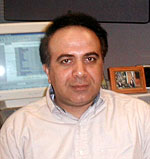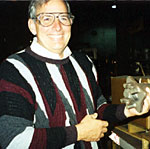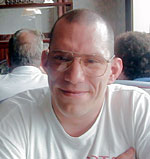Minnesota manufacturing is bleeding
By Erin Galbally, Minnesota Public Radio
October, 2001
Manufacturing operations in small towns throughout Minnesota thrived during the long boom of the 1990s. But the slowdown that's been working its way through the state for the last year has prompted thousands of layoffs by companies in greater Minnesota. Now the economic fallout from the September 11th terror attacks appears likely to push the economy into a full recession, and that's certain to mean more people will lose their jobs.
Over the 80 years that Dennis Dotson's family has owned the Mankato iron foundry that bears his name, they've experienced the changing winds of the economy, subsisting through hard times and profiting in good ones. Now as the company's third CEO, Dotson's dealing with a 30-percent drop in revenues from last year, and he foresees tough times ahead as America attempts to deal with the attacks.
As the industrial sounds of work continue on the production floor below, Dotson says he's shelved any plans for expansion until the economy shows signs of recovery. "Right now we're on four-day weeks and we're looking at taking an entire week out of production. We can't make inventory in our business, we only make what our customers order," he says.
The decision to shave hours off of the workweek predates the events of September 11th. Unlike many manufacturing firms, which have laid off large numbers of workers, Dotson says he's determined to keep his employees on the job.
In the aftermath of the attacks, Dotson says customer orders have slowed, but he's been able to keep his 100-plus workers busy filling orders for a variety of iron-crafted truck parts. With so many unknowns surrounding potential military action and additional security threats, Dotson says he's hopeful American companies can regain a greater piece of the domestic market.
"If a product is coming from Taiwan, India or Korea, it's on a boat and we can lock down the harbors for three weeks or four weeks. There's a risk out there. I think what's happening with the patriotism is that we're not going to get 100 percent of the product back, but we can do some blending. Can we have duplicate tooling? Can we provide product as a back up? I think that's an opportunity. Ask me in a year if it works," says Dotson.
Economists don't see much room for optimism. They say there's no evidence the long-term trend toward moving manufacturing operations to lower-cost locations overseas will change.
The director of research for the Department of Economic Security, Jay Mousa, says it's unlikely any surge in "buy America" patriotism would revive manufacturing in Minnesota.
"They may gain under abnormal or unusual circumstances for a month or two or three; they may expand their market share, but eventually things will return to normal and the rules of competition will come into play again and efficiency and meeting the customer needs will again differentiate between a successful operation and an unsuccessful one," according to Mousa.
Over the past decade, manufacturing companies like Dotson's have proven the rare bright spot in a rural landscape otherwise dominated by a troubled farm sector. But hard times that hit last year have led to more than 12,000 layoffs state wide. Ninety-percent of them in greater Minnesota.
Mousa expects steady gains in unemployment as more workers receive pink slips.
"Manufacturing in Minnesota in bleeding. We haven't seen such high numbers of job losses and layoffs. The initial claim for unemployment insurance claims is the highest of all industries and the increase from a year ago is over 200 percent," he says.
Mousa predicts the jobless rate - now at 3.percent in the state - may rise as high as 4.2 percent in coming months. But he points out that remains below the state's long-time average.
The layoff numbers have local officials across greater Minnesota scrambling to draw in new employers to sponge up what's expected to be an expanding population of displaced workers. Jay Mousa suggests people should contemplate switching industries, pointing out there are still jobs available in medical and technology fields.
Carl Williams may be just the person Mousa has in mind. When Williams was laid off last fall from a General Electric subsidiary - Midwest Electric Products in Mankato - he went back to school with plans to become a high school biology teacher and athletic coach. At a popular St. Peter lunch spot, Williams says with three small kids, a mortgage and car payments getting laid off was scary but in the long run a blessing.
"To tell you the truth, I was not satisfied with the blue-collar aspect. It's good money and normally fairly secure, but I wasn't satisfied and I knew I needed to do something that I was satisfied with. I had wanted to coach and I thought teaching would be a good avenue to get towards that means. It just kind of progressed where I wanted to do something anyway and this gave me the means to do something different," Williams says.
Williams says in the aftermath of the recent terrorist attack, he's even more grateful to be out of manufacturing. His family's livelihood now free from the fear of being tied to a sinking industry.
Still, some companies remain guardedly optimistic. Back in Mankato, Lyle Jacobson, the head of the emergency generator company, Kato-Light, has roughly a month to go before moving into a newly constructed larger facility. Since the late 1980s, Kato-Light's sales have jumped from approximately $7 million a year to nearly $55 million as of last year.
Jacobson says he expects earnings to continue rising. Sitting next a display of dark-colored fabric swatches destined for the new headquarters, Jacobson says he'll be watching business closely over the next few weeks.
"I'm the type of guy that doesn't overreact to any one particular thing," he says. "I'll wait to see the dust settle and see how things are going to go. We were seeing a bit of softening in some of the markets before this and they just hit the wall for the last couple of weeks and we're starting to see some activity again."
Until things pick up again, however, Kato-Light has frozen all hiring. Just when business will come back is open to question. But industry experts seem to agree that recession and rising layoffs will remain a fact of life until the middle of next year.
By Erin Galbally, Minnesota Public Radio
October, 2001
|
|
RealAudio |
Manufacturing operations in small towns throughout Minnesota thrived during the long boom of the 1990s. But the slowdown that's been working its way through the state for the last year has prompted thousands of layoffs by companies in greater Minnesota. Now the economic fallout from the September 11th terror attacks appears likely to push the economy into a full recession, and that's certain to mean more people will lose their jobs.
| |
|
|
|
||
As the industrial sounds of work continue on the production floor below, Dotson says he's shelved any plans for expansion until the economy shows signs of recovery. "Right now we're on four-day weeks and we're looking at taking an entire week out of production. We can't make inventory in our business, we only make what our customers order," he says.
The decision to shave hours off of the workweek predates the events of September 11th. Unlike many manufacturing firms, which have laid off large numbers of workers, Dotson says he's determined to keep his employees on the job.
In the aftermath of the attacks, Dotson says customer orders have slowed, but he's been able to keep his 100-plus workers busy filling orders for a variety of iron-crafted truck parts. With so many unknowns surrounding potential military action and additional security threats, Dotson says he's hopeful American companies can regain a greater piece of the domestic market.
| |
|
|
|
||
Economists don't see much room for optimism. They say there's no evidence the long-term trend toward moving manufacturing operations to lower-cost locations overseas will change.
The director of research for the Department of Economic Security, Jay Mousa, says it's unlikely any surge in "buy America" patriotism would revive manufacturing in Minnesota.
"They may gain under abnormal or unusual circumstances for a month or two or three; they may expand their market share, but eventually things will return to normal and the rules of competition will come into play again and efficiency and meeting the customer needs will again differentiate between a successful operation and an unsuccessful one," according to Mousa.
Over the past decade, manufacturing companies like Dotson's have proven the rare bright spot in a rural landscape otherwise dominated by a troubled farm sector. But hard times that hit last year have led to more than 12,000 layoffs state wide. Ninety-percent of them in greater Minnesota.
Mousa expects steady gains in unemployment as more workers receive pink slips.
| |
|
|
|
||
Mousa predicts the jobless rate - now at 3.percent in the state - may rise as high as 4.2 percent in coming months. But he points out that remains below the state's long-time average.
The layoff numbers have local officials across greater Minnesota scrambling to draw in new employers to sponge up what's expected to be an expanding population of displaced workers. Jay Mousa suggests people should contemplate switching industries, pointing out there are still jobs available in medical and technology fields.
Carl Williams may be just the person Mousa has in mind. When Williams was laid off last fall from a General Electric subsidiary - Midwest Electric Products in Mankato - he went back to school with plans to become a high school biology teacher and athletic coach. At a popular St. Peter lunch spot, Williams says with three small kids, a mortgage and car payments getting laid off was scary but in the long run a blessing.
"To tell you the truth, I was not satisfied with the blue-collar aspect. It's good money and normally fairly secure, but I wasn't satisfied and I knew I needed to do something that I was satisfied with. I had wanted to coach and I thought teaching would be a good avenue to get towards that means. It just kind of progressed where I wanted to do something anyway and this gave me the means to do something different," Williams says.
| |
|
|
|
||
Still, some companies remain guardedly optimistic. Back in Mankato, Lyle Jacobson, the head of the emergency generator company, Kato-Light, has roughly a month to go before moving into a newly constructed larger facility. Since the late 1980s, Kato-Light's sales have jumped from approximately $7 million a year to nearly $55 million as of last year.
Jacobson says he expects earnings to continue rising. Sitting next a display of dark-colored fabric swatches destined for the new headquarters, Jacobson says he'll be watching business closely over the next few weeks.
"I'm the type of guy that doesn't overreact to any one particular thing," he says. "I'll wait to see the dust settle and see how things are going to go. We were seeing a bit of softening in some of the markets before this and they just hit the wall for the last couple of weeks and we're starting to see some activity again."
Until things pick up again, however, Kato-Light has frozen all hiring. Just when business will come back is open to question. But industry experts seem to agree that recession and rising layoffs will remain a fact of life until the middle of next year.




